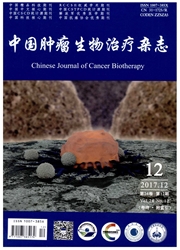

 中文摘要:
中文摘要:
目的:构建编码融合基因NT4-p53(N15)-Ant的重组腺病毒表达载体,为进一步基因治疗的实验研究奠定基础。方法:利用PCR体系延伸互为模板的引物,通过T载体克隆法获得p53(N15)-Ant基因克隆,酶切后连人pBV220/NT4质粒,再将融合基因NT4-p53(N15)-Ant亚克隆至腺病毒的穿梭质粒内,与辅助质粒PJMl7共同转染HEK-293细胞,通过同源重组获得重组腺病毒Ad.NT4-p53(N15)-Ant,收集病毒上清,大量扩增并测定其滴度,用RT-PCR检测目的基因在293细胞的表达情况。MTT比色法观察重组病毒对HepG2细胞存活率的影响。结果:克隆出p53(N15)-Ant基因,经酶切及测序证实结果正确;得到高滴度的(1×10^(11)pfu/ml)重组腺病毒表达载体;反转录聚合酶链反应证实感染Ad.NT4-p53(N15)-Ant的293细胞中有目的基因的表达。Ad.NT4-p53(N15)-Ant对HepG2细胞有强烈的杀伤作用,与Ad.GFP比较,NT4p53(N15)Ant重组腺病毒处理组HepG2细胞的存活率明显降低。结论:通过分子克隆体外重组技术成功制备了NT4-p53(N15)-Ant复制缺陷型重组腺病毒,为下一步的肿瘤基因治疗奠定了基础。
 英文摘要:
英文摘要:
Objective: To construct a recombinant adenovirus vector harboring fusion gene NT4-p53 (N15)-Ant , laying a foundation for gene therapy research of malignant tumors. Methods : The p53 ( N15 ) -Ant gene was obtained by T-vector method and was inserted in pBV220/NT4 vector after digested with restriction enzyme. The fusion gene of NT4-p53 (N15)-Ant was subcloned into the shuttle plasmid of adenovirus; the products were cotransfered into HEK-293 cell line with helper plasmid PJM17. The recombinant adenovirus was produced by homologous recombination of above 2 plasmids in HEK-293 cells and its titer was measured by plaque-forming. The expression of Ad. NT4p53Ant in transfected 293 cells was confirmed by reverse transcription polymerase chain reaction (RT-PCR) procedure. The effect of Ad. NT4p53Ant on HepG2 cell line was measured by a colorimetric 3-(4, 5-dimethyl-2-thiazolyl)-2, 5-diphenyl-2H-tetrazolium bromide (MTT) assay. Results: The p53 (N15)-Ant gene was confirmed by restriction enzyme digestion and DNA sequencing. High titer of recombinant adenovirus was obtained by homologous recombination in HEK-293 cells ( 1 × 1011 pfu/ml). The expression of NT4-p53 ( N15 )-Ant gene in 293 cells was confirmed by RT-PCR. Ad. NT4p53Ant had strong killing effect on HepG2 cells. Compared with Ad. GFP, Ad. NT4p53Ant significantly decreased the survival rate of HepG2 cells. Conclusion: The recombinant adenovirus vector encoding gene NT4-p53 (N15)-Ant has been successfully constructed in this experiment by molecular cloning and in vitro recombination techniques, laying a foundation for further research of gene therapy of cancer.
 同期刊论文项目
同期刊论文项目
 同项目期刊论文
同项目期刊论文
 期刊信息
期刊信息
